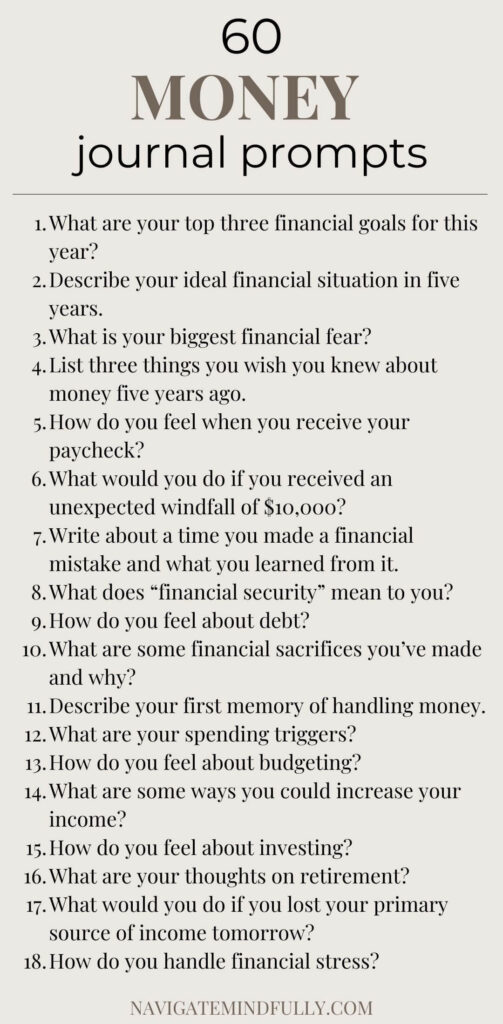60 Money Journal Prompts to Transform Your Money Mindset
Have you ever found yourself overwhelmed by your finances? Trust me, you’re not alone. One of the best ways to get a grip on your money matters is through journaling. Yep, you heard that right! Journaling isn’t just for capturing your thoughts or daily events; it can also be a powerful tool for financial well-being. In this post, we’re diving into the world of money journal prompts—little questions or statements that can help you gain clarity, make smarter decisions, and even improve your relationship with money. So, let’s get started, shall we?
What Is a Money Journal?
Let’s talk about what a money journal actually is. Imagine having a dedicated space where you can jot down all your thoughts, feelings, and plans about your finances. That’s essentially what a money journal is—a special notebook or digital document where you can explore your relationship with money. It’s like having a financial best friend who’s always there to listen, without any judgment.
Now, what makes a money journal truly magical are the prompts you use. These are specific questions or statements designed to guide your writing and thinking. Whether you’re pondering your spending habits or dreaming about financial freedom, these money journal prompts help you dig deeper. They’re not just questions; they’re triggers for self-discovery and positive change.

60 Money Journal Prompts to Develop Money Mindset
Let’s dive into money journal prompts that can help you navigate your financial journey. Feel free to use these in your money journal to spark insights and make meaningful changes.
Money Writing Prompts
- What are your top three financial goals for this year?
- Describe your ideal financial situation in five years.
- What is your biggest financial fear?
- List three things you wish you knew about money five years ago.
- How do you feel when you receive your paycheck?
- What would you do if you received an unexpected windfall of $10,000?
- Write about a time you made a financial mistake and what you learned from it.
- What does “financial security” mean to you?
- How do you feel about debt?
- What are some financial sacrifices you’ve made and why?
- Describe your first memory of handling money.
- What are your spending triggers?
- How do you feel about budgeting?
- What are some ways you could increase your income?
- How do you feel about investing?
- What are your thoughts on retirement?
- What would you do if you lost your primary source of income tomorrow?
- How do you handle financial stress?
- What are your thoughts on charitable giving?
- Write a letter to your future self about your financial hopes and dreams.
Money Mindset Journal Prompts
- What beliefs about money were you taught growing up?
- How do you feel about wealth?
- What does “financial freedom” mean to you?
- Do you think you deserve financial success? Why or why not?
- What are some positive affirmations you can say about money?
- How does your financial situation affect your self-esteem?
- What are some limiting beliefs you have about money?
- How can you shift from a scarcity mindset to an abundance mindset?
- What are your thoughts on the saying, “Money can’t buy happiness”?
- How do you feel about asking for a raise or charging more for your services?
- What are your thoughts on money and relationships?
- Do you think money is evil?
- How do you feel about financial independence?
- What are some financial taboos you wish people would talk about more?
- How do you define “success” in terms of finances?
- What are your thoughts on work-life balance and income?
- How do you feel about money and gender roles?
- What are your thoughts on money and power?
- How do you feel about money and spirituality?
- What would you like your financial legacy to be?
Money Manifestation Journal Prompts
- What would your life look like if money were no object?
- Visualize your dream home. How does it feel to live there?
- What are some financial miracles you’d like to manifest?
- Write a gratitude list focused on your current financial blessings.
- How would you contribute to the world if you had unlimited resources?
- What are some affirmations to attract wealth and abundance?
- Visualize receiving a check for an enormous amount. How do you feel?
- What are some signs or synchronicities that show you’re on the path to financial abundance?
- How would you feel if all your debts were suddenly paid off?
- What are some luxuries you’d indulge in if you could afford them?
- Visualize a day in your life five years from now, living your financial dream.
- What are some actions you can take to align with your financial desires?
- How would your relationships change if you were financially secure?
- What are some experiences you’d like to have that require financial resources?
- How would you invest in yourself if you had the financial means?
- What are some businesses or ventures you’d start if money weren’t an issue?
- How would you give back to your community with abundant resources?
- What are some financial fears you’d like to release?
- Visualize your bank account growing exponentially. How does that make you feel?
- Write a letter to money, expressing your desires and intentions for a prosperous relationship.
Pin these money journal prompts for later!

How to Use Money Journal Prompts
So, you’ve got your money journal and a list of thought-provoking prompts. What’s next? Using money journal prompts is a simple yet transformative process. Let me guide you through it.
Step 1: Choose Your Space
First things first, decide where you’ll be doing your journaling. It could be a physical notebook, a digital document, or even a dedicated app. The key is to choose a space that feels comfortable and private, where you can be honest without judgment.
Step 2: Set the Mood
Before you dive in, take a moment to set the mood. Maybe light a candle, play some soft music, or make a cup of your favorite tea. Creating a calming environment can help you focus and make the journaling process more enjoyable.
Step 3: Pick a Prompt
Now, go ahead and choose a prompt that resonates with you. Don’t overthink it; go with your gut feeling. Remember, there’s no right or wrong prompt; it’s all about what you’re curious to explore.
Step 4: Free Write
Once you’ve picked your prompt, start writing. Let your thoughts flow freely without worrying about grammar or structure. The goal is to dig deep and uncover your true feelings and beliefs about money.
Step 5: Reflect and Analyze
After you’ve finished writing, take some time to read what you’ve written. Reflect on your thoughts and see if any patterns or insights emerge. This is where the real magic happens.
Step 6: Take Action
Based on your reflections, think about any actions you can take. Maybe you’ve realized you need to be more mindful of your spending, or perhaps you’ve uncovered some limiting beliefs that you want to work on. Whatever it is, jot down some actionable steps.
Step 7: Make It a Habit
Consistency is key when it comes to journaling. Try to make it a regular practice, whether it’s once a week or even daily. The more you journal, the more insights you’ll gain, and the closer you’ll get to your financial goals.
Final Thoughts On Journaling For Money
Journaling about money is like having a heart-to-heart chat with your wallet. It’s a simple way to get to know your spending habits, your savings goals, and even your money fears. And don’t worry, your journal won’t judge you; it’s a safe space to be totally honest.
The prompts we talked about are like little road signs. They guide you, helping you ask the right questions so you can find your own answers. It’s like having a map for your money journey.
If money has ever made you anxious or if you’re just curious to dig a little deeper, journaling is a great place to start. It’s easy, it’s private, and it can really help you make better choices with your money.
So why not give it a shot? A few minutes of writing could lead to a lifetime of financial peace of mind. Let’s get that pen moving!







